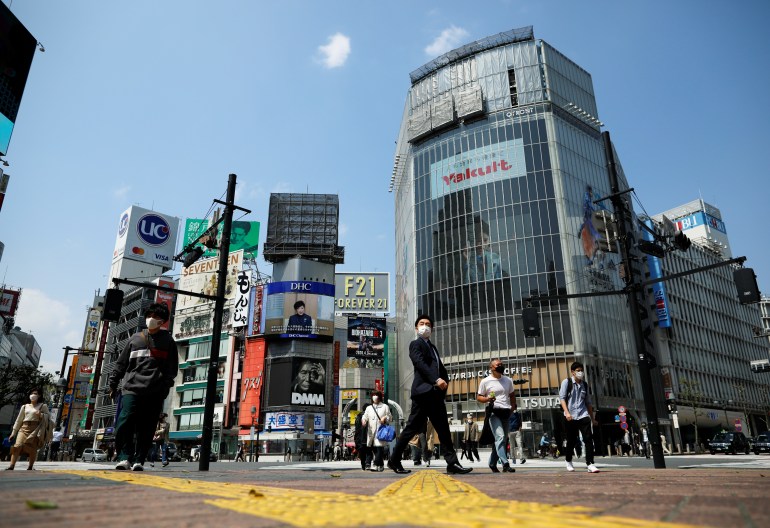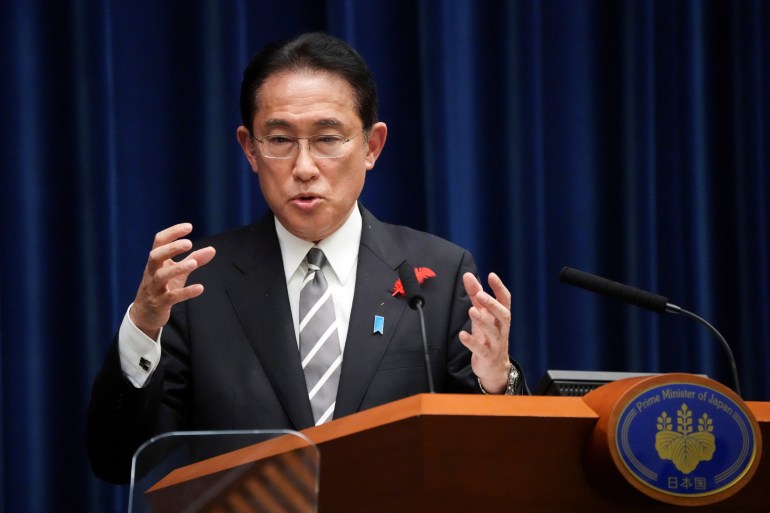Tokyo, Japan – Mr Toyozawa, an advertising sales representative in Tokyo, is not much better off today than when he started working at his company in 2001.
For years, Toyozawa’s salary rose in annual increments of 1 percent and, like many Japanese salarymen at or approaching retirement age, his earnings have gone into reverse since he turned 55 two years ago.
“I wish my company recognised how hard I work and I wish they appreciated the work I do,” Toyozawa, who asked to only be referred to by his surname, told Al Jazeera.
“I wish that was reflected in my salary.”
Toyozawa’s plight is common in Japan, where more than three decades of economic stagnation have resulted in some of the weakest wage growth in the developed world.

Japanese workers took home an average salary of $41,509 in 2022 in purchasing power parity terms, hardly unchanged from $40,379 in 1991, according to data from the Organisation for Economic Cooperation and Development (OECD).
While Japan’s wages rose by just 2.8 percent over the period, average pay across the OECD climbed by 32.5 percent.
Today, Japanese employees earn only about three-quarters as much as their developed country counterparts.
Japan’s stagnant wage growth has been a headache for policymakers in the world’s third-largest economy since the bursting of a stock market and real estate bubble in the early 1990s.
The crash, coupled with a strong yen, low labour productivity, a shrinking population and controversial policy decisions such as consumption tax hikes, has been blamed for a decades-long spiral of declining prices that has only recently begun to reverse.
“To achieve a sustainable high wage growth rate, we need an improvement of labour productivity,” Takahide Kiuchi, an economist at the Nomura Research Institute in Tokyo, told Al Jazeera.
“Unfortunately the labour productivity growth rate has been declining considerably over the [last] 30 or 40 years.”

Japanese Prime Minister Fumio Kishida has pledged to tackle stagnating wages as a priority so that workers receive pay hikes as “a matter of course.”
Kishida has pushed for a record hike in the minimum wage to 1,000 yen ($7.21) and, like his recent predecessors, stressed the need to reform the country’s rigid labour market, which traditionally guaranteed lifetime employment, and raise the chronically low birthrate.
Kishida, who worked in finance before entering politics, has laid much of the responsibility for fixing the problem at the feet of employers, whom he has repeatedly urged to offer more generous wages and accused of not fairly sharing the gains of decades of robust corporate profits.
“The core of a virtuous economic cycle lies in wage growth,” he said during a meeting with business groups in January. “I’m calling for pay rises that beat inflation and the government will back such efforts.”
Japanese firms have taken heed of Kishida’s calls, at least for the time being.
Earlier this month, Rengo, Japan’s largest umbrella union, released a survey that showed the biggest employers had agreed to an average pay hike of 3.58 percent for this year, which would be the biggest jump since 1993.
In May, workers’ nominal wages rose by 2.5 percent, according to labour ministry data, the biggest rise in 28 years.
Even so, inflation, now running at its highest since the early 1980s after decades of falling prices, swallowed up those gains as real wages fell by 1.2 percent.

“I think the high acceleration of wages this year will be a temporary event,” said Kiuchi, the Nomura Research Institute economist. “I think it will not necessarily lead to sustainable wage acceleration.”
For some Japanese business owners, particularly those running small and medium-sized enterprises, the government’s calls for bigger pay packets feel out of touch with the reality of the economic climate.
Takuya Maeda, the owner of cybersecurity consultant firm Aslink Communications in Tokyo, said he would like to be able to offer higher wages, but can only offer annual raises of about 2.5 percent to his top-performing employees.
“I agree with Prime Minister Kishida that living costs and necessities like power are getting higher in Japan so it’s natural that we should raise salaries,” Maeda told Al Jazeera. “But at the same time, it is difficult for us to do it, because our customers are not willing to pay us more, so we are stuck.”
“Prime Minister Kishida doesn’t know the whole picture,” Maeda said.
“Maybe he had a chance to have a lot of discussions with bigger companies, but they don’t know the real voices like our company and small and medium size companies that suffer.”
Digitisation
Maeda said the government will need to undertake major reforms, including making it easier to hire and fire employees if it is serious about spurring wage growth.
“That’s one of the big issues the Japanese government has to face. I don’t think they will do it because it doesn’t align with Japanese culture to make dramatic changes,” he said.
“Japanese people don’t demonstrate much compared to other countries. But if that happened, you’d see demonstrations all over the place.”
Martin Shulz, the chief policy economist at Fujitsu, said that Japanese firms increasingly recognise they have to offer better wages to boost productivity and grow their market share, especially to younger high-skilled employees.
“Now they are seeing with digitalisation, that productivity is going up so they can pay those who are supporting the higher productivity higher wages and they also have to, because these are younger [employees] that they have to hire into the market,” Shulz told Al Jazeera.
Shulz said firms should do more to get women into mid-level and senior roles and introduce more family-friendly work policies to help expand the workforce, which is shrinking due to the rapidly ageing population.
“This requires quite a bit of a culture change still,” he said.

For workers nearing the end of their career like Toyozawa, the shift towards a more productive workforce, which calls for hiring younger, high-skilled employees, could prove to be a bitter pill to swallow.
“What they are trying to do is to pay more to skilled people, like those kids, and cut down the average worker’s salary,” Toyozawa said, describing an influx of digitally-savvy young employees at his advertising firm.
“I think that’s why I am stuck. The people who are very good with the digital world are getting more pay than I do.”
Japan’s workers cry out for a raise after decades of stagnant pay - Al Jazeera English
Read More
No comments:
Post a Comment